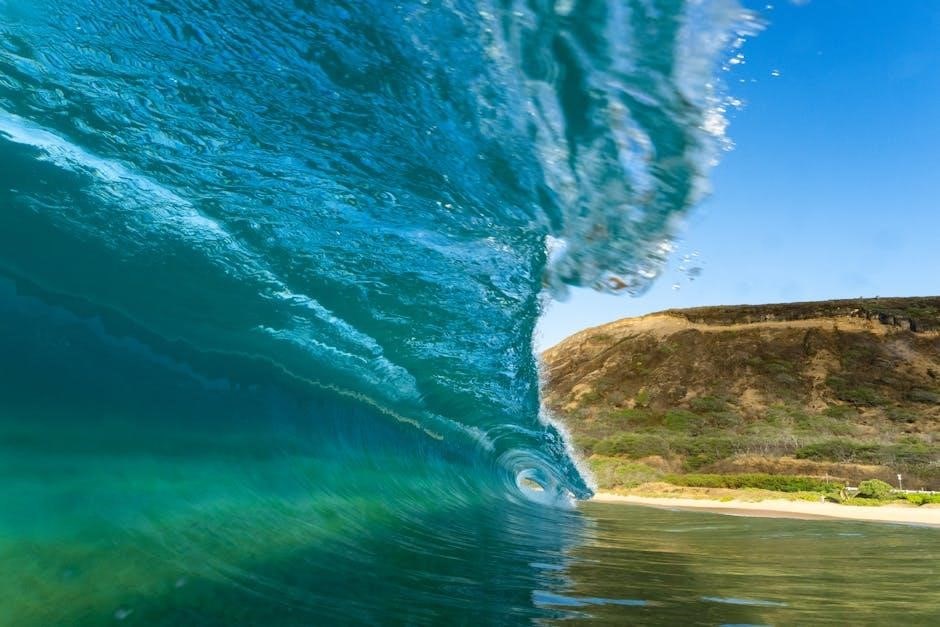This guide provides essential insights into water heater energy efficiency, helping you understand types, costs, and environmental impact․ It aids in making informed decisions for savings and sustainability․

Types of Water Heaters
This section explores tank, tankless, solar, immersion, and heat pump water heaters, each offering unique benefits in energy efficiency and functionality․
Tank Water Heaters
Tank water heaters are the most common type, storing hot water in an insulated tank․ They use electric, gas, or oil to heat water continuously․ While energy-efficient models are available, standby heat loss can increase energy costs․ Regular maintenance, such as checking temperature-pressure relief valves and insulating exposed pipes, is crucial for optimal performance․ These heaters are ideal for households with high hot water demand but may require more space and have higher installation costs compared to tankless options․
Tankless Water Heaters
Tankless water heaters provide on-demand hot water without storage, enhancing efficiency․ They heat water only when needed, reducing energy waste․ Ideal for low to moderate usage, they offer significant energy savings․ Compact designs save space, suitable for smaller homes․ Available in electric, gas, or propane, they fit various setups․ Higher initial costs and complex installation may deter some users․ Proper sizing and professional setup are essential for performance․ Regular maintenance, like descaling, ensures longevity․ They are an eco-friendly option due to reduced standby heat loss․

Solar Water Heaters
Solar water heaters harness renewable energy from sunlight to heat water, reducing reliance on electricity or fuel․ They are eco-friendly and cost-effective in sunny regions․ These systems use solar panels to absorb heat, transferring it to water stored in a tank․ While initial installation costs are high, long-term savings and incentives offset expenses․ They are ideal for homes with ample sunlight but may require a backup system for cloudy days․ Maintenance is minimal, but proper installation and sizing are crucial for efficiency․ Solar water heaters offer a sustainable solution for water heating needs, promoting energy independence and environmental benefits․

Energy Efficiency Ratings and Standards
Energy efficiency ratings help consumers choose water heaters that minimize energy consumption and costs․ Standards ensure safety and environmental compliance, promoting sustainable water heating solutions․
Understanding EF Ratings
Energy Factor (EF) measures water heater efficiency, indicating how much energy is converted into usable hot water․ Higher EF values mean greater efficiency and lower energy consumption․ For tank and tankless heaters, EF is calculated based on heat recovery and standby losses․ Electric water heaters are rated by standby loss in watts, while solar heaters use Solar Energy Factor (SEF)․ Understanding EF helps consumers choose energy-efficient models, reducing energy bills and environmental impact․ Always look for higher EF ratings to maximize savings and performance․ This metric is crucial for evaluating water heater energy efficiency and making informed purchasing decisions․
How to Calculate Energy Costs
To calculate energy costs for your water heater, consider the unit’s efficiency, usage patterns, and local electricity rates․ Start by identifying the heater’s power consumption in kWh (kilowatt-hours) and its Energy Factor (EF)․ Multiply the kWh by your daily usage hours and the cost per kWh․ For example, a 4․5 kWh heater used 2 hours daily at $0․12/kWh costs $1․08/day or $394/year․ Adjust for standby losses and efficiency ratings to refine estimates․ Accurate calculations help budget and identify energy-saving opportunities, ensuring optimal performance and cost savings over time․ This approach aids in making informed decisions for your water heating needs․
Factors Affecting Energy Efficiency
Several factors influence the energy efficiency of water heaters․ The type of heater, such as tankless or tank-style, impacts efficiency due to differences in heat retention and standby losses․ Insulation quality plays a crucial role in minimizing heat loss․ Heater size and capacity relative to household needs also affect efficiency; oversized units may waste energy, while undersized ones can overwork․ Fuel type, including gas, electric, or solar, varies in efficiency and energy costs; Usage patterns, like hot water demand, and regular maintenance practices, such as checking for sediment buildup, further impact performance․ Additionally, the Energy Factor (EF) rating, which measures efficiency, is a key determinant․ Understanding these factors helps optimize energy use and reduce costs․

Costs and Savings
Water heater costs and savings vary by type, with tankless and solar options offering long-term energy savings despite higher installation costs, while incentives can offset expenses․
Installation Costs and Considerations
Installation costs vary widely depending on the type of water heater and complexity of the job․ Tank water heaters are generally cheaper to install, with prices ranging from $300 to $2,000, while tankless and solar systems can cost $1,000 to $7,000 or more due to specialized labor and materials․ Permits, wiring, and venting requirements also add to expenses․ Electric water heaters may need upgraded circuits, while gas models require proper venting․ Local plumbing codes and labor rates further influence costs․ Additionally, some installations may require additional components, such as temperature and pressure relief valves․ Always consult a licensed professional for accurate estimates and ensure compliance with safety standards․ Incentives and rebates may help offset initial expenses, making energy-efficient options more affordable in the long run․
Operating Costs and Energy Consumption
Operating costs for water heaters depend on the type, usage patterns, and energy efficiency․ Electric water heaters typically have higher energy consumption due to standby heat loss, while gas models are generally more efficient․ Tankless heaters save energy by only heating water when needed, reducing standby losses․ Solar water heaters offer the lowest operating costs over time, as they rely on renewable energy․ Energy consumption can be minimized by adjusting temperature settings, insulating pipes, and maintaining optimal system performance․ Understanding your household’s water usage patterns is key to estimating long-term energy costs and identifying opportunities for savings․
Financial Incentives and Rebates
Financial incentives and rebates are available to encourage the adoption of energy-efficient water heaters․ Governments, utilities, and organizations offer rebates for installing high-efficiency models, such as heat pump or solar water heaters․ These incentives can significantly reduce upfront costs․ Additionally, tax credits may apply for eco-friendly systems․ Rebates often vary by location and provider, so checking local programs is essential․ Some utilities also offer special rates for energy-efficient appliances․ By taking advantage of these incentives, homeowners can offset initial installation costs and enjoy long-term energy savings․ Always verify eligibility criteria and application processes for available rebates․
Maintenance and Safety Tips
Regularly check temperature settings, inspect heating elements, and address leaks promptly․ Always follow safety guidelines to optimize efficiency and prevent hazards․ Proper maintenance ensures longevity and safety․
Regular Maintenance for Optimal Performance
Regular maintenance is crucial for extending the lifespan and efficiency of your water heater․ Start by flushing the tank annually to remove sediment buildup, which can reduce performance and increase energy bills․ Inspect the anode rod for corrosion and replace it if necessary to prevent tank damage; Additionally, check the temperature and pressure relief valve to ensure it’s functioning correctly․ Inspect heating elements for mineral buildup and clean them as needed․ Finally, monitor for leaks around connections and address them promptly․ Regular checks can prevent breakdowns and ensure safe, efficient operation․

Safety Considerations

Safety is paramount when operating a water heater․ Always set the temperature below 120°F to prevent scalding and reduce energy waste․ Ensure the pressure relief valve is functioning correctly to avoid dangerous pressure buildup․ For gas models, proper ventilation is essential to prevent carbon monoxide buildup․ Regularly inspect for leaks and corrosion, addressing them promptly to avoid hazards․ Keep the area around the heater clear of flammable materials and ensure only qualified professionals handle installations or repairs․ Adhering to these guidelines ensures safe and reliable operation․
How to Choose the Right Water Heater for Your Needs
Selecting the right water heater involves assessing your household’s needs, lifestyle, and budget․ Consider your family size, hot water demand, and available energy sources․ Measure your space to determine if a tank, tankless, or solar model fits best․ Evaluate energy efficiency ratings like EF and Energy Star certification to balance performance and costs․ Compare upfront installation expenses with long-term savings․ Lastly, explore incentives like rebates or tax credits for eco-friendly options․ By weighing these factors, you can choose a water heater that optimizes comfort, efficiency, and affordability for years to come․
Selecting the right water heater is a crucial decision that impacts energy consumption, costs, and environmental sustainability․ By understanding your needs, exploring options like tank, tankless, and solar models, and evaluating efficiency ratings, you can make an informed choice․ Modern technologies offer improved performance and cost savings, while incentives like rebates further enhance affordability․ Prioritizing energy efficiency not only reduces utility bills but also supports eco-friendly practices․ This guide equips you with the knowledge to select a water heater that aligns with your lifestyle, budget, and commitment to sustainability for years of reliable service and energy savings․